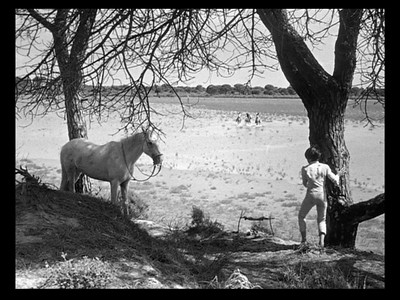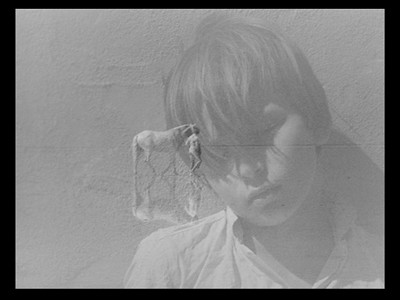
White Mane is a short children's film by French director Albert Lamorisse (The Red Balloon). Made in 1952, it's an uncomplicated morality play that takes place in the natural fields and marshes in the South of France. Despite having won the Palme d'or for the Best Short at the 1953 Cannes Film Festival and receiving praise from critics as prestigious as Pauline Kael, it's never been readily available in the United States. Unlike the other releases in the Janus Films children's line, I don't even have a vague memory of maybe seeing it at any point as a kid. Which is too bad, since like Paddle to the Sea (which I think I might have seen on TV), I would have found much to identify with in the story. As an adult watching these movies now, it's hard not to get nostalgic for those times, to remember my own past, and insert myself as a boy into the narrative, much like children do when they experience any entertainment.
The horse White Mane is the lead stallion in a herd of wild horses. A local landowner attempts to catch the pure white creature and tame him, but he's too wild and breaks free, returning to the grassy land. This is all witnessed by Folco (Alain Emery), a young boy who fishes in the marshes where he lives with his family. He is intrigued by White Mane, and when the landowner tells him that the horse will belong to anyone who catches him, Folco decides that the someone will be him. Naturally, Folco doesn't have much luck at first, but when he rescues White Mane from one of the traps the horse's hunters lay for him, White Mane accepts the boy as a rider. The herdsmen remain obsessed with White Mane, however, and the landowner appears to be reneging on the promise of ownership, so Folco and White Mane try to outrun the snare of the adult world together.

My dad raised horses all of my life, and when I was in elementary school, I was a pretty accomplished rider. A series of accidents, however, caused me to develop a phobia about horses in my adolescence, rendering me unable to get back on one even to this day. One of the bad memories that haunts me and prevents me from returning to equestrian activities involves my father trying to "break" a young filly. "Break" is the actual term used for teaching a horse to hold a saddle and, by extension, a rider. Up until a certain age, a horse doesn't carry anything on her back, and the natural reflex to having a saddle placed on her back is to toss it off. Get a particularly stubborn horse, and the training process can be protracted and dangerous. For whatever reason, on this particular day, my father decided to make me part of the process. My older sister had helped in the past, but now it was my turn. Until this very moment, writing this now, I had never stopped to think if maybe this was some kind of attempt to "break" me, too, some idea that this would usher me forward toward manhood.
Seeing my dad throw the saddle on this filly, who I think was named Missy, over and over, and seeing her throw it off over and over and, rather than grow more passive or wear down, get more and more frenzied, was really freaking me out. Missy was trying to leap over the corral, she was kicking, her nostrils were flaring, a viscous lather was forming on her thighs--the horse was doing everything she could to keep from being broken. In response, my dad also became more and more frustrated, and it turned into a scary battle of wills between the two of them. I didn't care who won, all I knew was I didn't want to get on that horse. Eventually, Missy ended up tangled in some barbed-wire fencing and cut herself badly above the front legs, the battle of wills halted by physical injury. I'm ashamed to say that I was more relieved to be getting out of the horrible task than I was sympathetic to the horse for having gotten hurt.

I relate this story because the driving event of White Mane is the herdsmen trying to take the horse out of his natural environment and bend his will to their own designs. As a symbol of freedom, a pure white horse has been regularly used by filmmakers as disparate as Andrzej Wajda and David Lynch. A white horse can represent an untouched state, an image of nobility and of how things should be. Though Lamorisse never says anything of the kind, to take White Mane out of his natural habitat is an immoral act, the disruption of the order of things.
Really, Lamorisse doesn't say much at all in this picture, at least not in any explanatory sense. The film is mostly silent, with only the bare minimum of dialogue and narration. (Though the original audio is in French, there is an option for new English narration on the DVD.) If a child is to glean anything from White Mane, it's to come from drinking in the gorgeous black-and-white photography of the untouched French countryside. (In that aspect, this DVD is pristine; the picture is entirely without blemish.) White Mane's film style is practically Neorealist in its preservation of the landscape and even little Folco's rundown shack. The scenes of him and his family--a younger sister, and a man that is maybe a grandfather--are achingly real, their content faces showing no hint of being burdened by the poverty that surrounds them. Though Lamorisse employs sophisticated editing to create a mis en scene that has little in common with pure documentary, White Mane does not contain a hint of falseness. It very well could be a documentary.
And what could a child glean from this? That nature is to be respected, that individuality is to be preserved, and to stand up for what's right need not be a grandiose act, it's something even the smallest of us can do. The herdsman aren't cartoonish villains twisting their moustaches and cackling over their cruelty; rather, they are men who, like my father on that awful day, got such tunnel vision, they failed to see how far their actions had taken them from what's proper and only wake up when it's too late.

It's weird watching White Mane with adult eyes. The movie concludes with the horse and boy heading off into the sunset by swimming across a vast ocean (just like Paddle to the Sea!). According to the narration, they are heading for a land where there is pure harmony, where man and beast are never selfish or mean to one another. If I were still a boy, I would accept at face value that this was some kind of magic, that the land they were heading for did exist and was of some mystical other dimension. As an adult, and as often happens when I am revisiting children's entertainment, I was struck by how grave the imagery really is. The best kid's material always has darker undercurrents. Though if you have children they will likely never consider this, if you watch White Mane on your own, it will be hard not to see Folco and White Mane as swimming toward death. The metaphor is too obvious, and as a metaphor, your reaction to it will likely depend on your own belief in an afterlife, in a world beyond this one, what lies just over the horizon. As with any parable, White Mane shows that actions have both consequences and rewards, and the two are interchangeable depending on where in life you find yourself when you get the message.


2 comments:
I know I saw a movie called "White Mane" in the early 1960s on American TV. It struck me so profoundly that it is the only film I specifically recall seeing from that era. The ending image of the boy swimming out to sea astride White Mane is as vivid to me today as it was when I last saw it more than 50 years ago.
At the time, cable was not widely available in my small rural Florida town so the only tv channels we could access were the 3 broadcast stations, ABC, CBS and NBC. In other words, the White Mane I saw HAD to be on one of the big 3 and, although it could have been Lamorisse's production, I find it hard to accept that a French speaking film would have been broadcast on one of those channels in the early 1960s. So it must have been an english adaptation of Lamorisse's film.
Try as I may, however, I have been unable to find any reference or evidence at all to confirm my recollection. Perhaps, but I doubt it, the whole thing is a product of my imagination.
It's probably this. There was an English language dubbed version.
Post a Comment